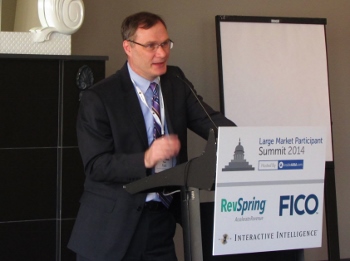The second annual Large Market Participant Summit 2014, hosted in Washington, DC by insideARM.com, began Thursday morning with a presentation and Q&A session from Tom Pahl, Managing Counsel in the Office of Regulations at the CFPB.
Pahl will be a key member of the legal team that oversees debt collection rulemaking after the Bureau’s advance notice of proposed rulemaking (ANPR) comment period closes. He discussed the process for debt collection rulemaking and why the CFPB chose this path over other methods of regulation.
First, Pahl noted that rulemaking for debt collection was discretionary for the CFPB under Dodd-Frank, unlike mortgage rulemaking — for example — which was mandated by the legislation. But Pahl said that the Bureau decided to pursue new debt collection rules because consumers have no choice in their dealings with the ARM industry and complaint volumes support additional rules. He also noted that technology gaps between the current environment and the FDCPA, passed in 1977, lends itself to additional clarification.
The process for new rules for the collection industry was laid out. Although no specific timetable was given, Pahl said that after the ANPR comment period closes, his team will be writing regulatory text that will be issued in a Notice of Proposed Rulemaking (NPR), which will also be subject to a comment period. The NPR should contain specific new rules.
In addition to the input from comments, Pahl said the CFPB will be using complaint data, prior government efforts (specifically, the reports issued by the FTC), and consultation with state regulators and enforcers to guide their regulatory language.
After his remarks, Pahl took questions from the crowd of around 100 gathered at the W Hotel in downtown Washington.
One participant noted that the concept of “strict liability,” which often gives rise to lawsuits over technical violations, was not addressed in the 160+ questions posed by the CFPB in its ANPR. Pahl said that while that was true, the actual rules resulting from the process would indirectly impact strict liability and should help collection agencies with technical violation accusations.
For example, he noted, if the rulemaking process results in standard language for validation notices, as long as ARM firms use the language, there would be “fewer possibilities of technical issues” in the area of validation notices.
Another question dealt with the costs associated with the “shotgun approach” used by the CFPB in civil investigative demands (CIDs). Pahl said that while he is not in the enforcement office of the Bureau, he did spend time in that capacity while at the FTC. He conceded that the CID process could be more targeted, and that the collection, verification, and responses to consumer complaints will help the CFPB become more targeted in its investigations.
The insideARM Large Market Participant Summit – generously underwritten by FICO, Interactive Intelligence, and RevSpring — is running through Friday. Check back on insideARM.com for updates throughout today and tomorrow and follow us on Twitter under the hashtag #iasummit2014.




![[Image by creator from ]](/media/images/patrick-lunsford.2e16d0ba.fill-500x500.jpg)

![the word regulation in a stylized dictionary [Image by creator from ]](/media/images/Credit_Report_Disputes.max-80x80.png)
![Cover image for New Agent Onboarding Manuals resource [Image by creator from insideARM]](/media/images/New_Agent_Onboarding_Manuals.max-80x80_3iYA1XV.png)


![Report cover reads One Conversation Multiple Channels AI-powered Multichannel Outreach from Skit.ai [Image by creator from ]](/media/images/Skit.ai_Landing_Page__Whitepaper_.max-80x80.png)
![Report cover reads Bad Debt Rising New ebook Finvi [Image by creator from ]](/media/images/Finvi_Bad_Debt_Rising_WP.max-80x80.png)
![Report cover reads Seizing the Opportunity in Uncertain Times: The Third-Party Collections Industry in 2023 by TransUnion, prepared by datos insights [Image by creator from ]](/media/images/TU_Survey_Report_12-23_Cover.max-80x80.png)
![[Image by creator from ]](/media/images/Skit_Banner_.max-80x80.jpg)
![Whitepaper cover reads: Navigating Collections Licensing: How to Reduce Financial, Legal, and Regulatory Exposure w/ Cornerstone company logo [Image by creator from ]](/media/images/Navigating_Collections_Licensing_How_to_Reduce.max-80x80.png)
![Whitepaper cover text reads: A New Kind of Collections Strategy: Empowering Lenders Amid a Shifting Economic Landscape [Image by creator from ]](/media/images/January_White_Paper_Cover_7-23.max-80x80.png)